Start-ups are at the forefront of healthcare innovation, developing cutting-edge solutions that address current challenges and pain points in the patient journey. Alex Bedenkov, Ryan Bate, Madeleine Thun, Abhay Kakde, Ankita Deshpande, and Gill Hayes write that partnership with industry can be the catalyst for start‑ups to accelerate their progress in shaping the healthcare ecosystems of tomorrow. But there is room for improvement in how the industry supports and collaborates with innovators.
The healthcare landscape is evolving at an incredibly fast pace, with patients facing new challenges every day. Increased life expectancy, rising healthcare costs and digital technology are driving disruptive change, while big data and artificial intelligence (AI) are becoming increasingly integrated into patient care. Enhanced understanding of disease mechanisms is fuelling the development of new treatments and the ability to better predict patient outcomes. It is clear that an opportunity exists to address current healthcare challenges, leveraging the unique potential of partnerships with non-traditional industry start-ups, and reimagining the path to future people-centric healthcare by collaborating alongside the patient journey and across industry verticals.
Gathering insights from healthcare innovators
A recent founders’ survey, conducted by AstraZeneca’s Global Health Innovation Hubs (A.Catalyst) Network, aimed to analyse the changing needs of entrepreneurs within healthcare ecosystems and to better understand their focus areas, strategies and key challenges.
For the ‘Future of healthcare: Focus on innovative founders’ survey, a questionnaire was sent to healthcare start-ups across 26 countries, generating 257 responses. The research gathered a range of insights from the respondents, centred around current and future partnerships, while also looking at how health equity is perceived and embedded in technology and innovative healthcare solutions.
About the respondents
Of those who responded to the survey, 81% were start-up founders or co-founders, with a further 12% being part of the leadership team. Most of the companies (88%) said they provide health tech solutions related to the ‘4 Ds’ – drugs, diagnostics, data and devices. They are currently working with a range of partners in the healthcare ecosystem, from healthcare and pharmaceutical companies (51%) and government organisations (42%) to academic institutions (33%) and other start-ups (30%).
Innovative solutions to address top healthcare priorities
Looking forward, it is clear that founders have a prominent role to play in healthcare, but what should be their main focus in the coming years? According to 84% of survey respondents, a primary role of entrepreneurs in the healthcare ecosystem is to deliver innovative solutions and thinking, while 70% agreed that a key focus should be developing a deeper understanding of patient needs (Fig. 1). Considering the most urgent health challenges to be addressed, 31% of founders felt that making healthcare fairer was a top priority, while expanding access to medicines (18%) and stopping infectious diseases (14%) also ranked highly.
Figure 1. What is the primary role of entrepreneurs within the healthcare ecosystem over the next 10 years?
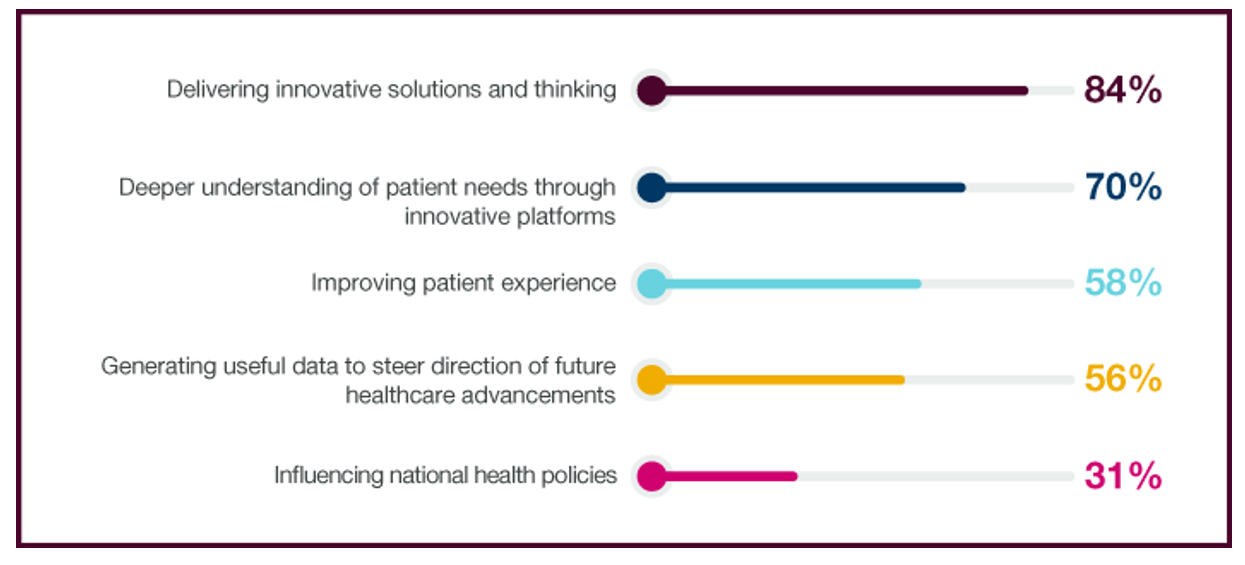 When asked about the trends with the potential to disrupt the traditional healthcare landscape, 24% of respondents ranked screening, early diagnosis and intervention as a key driver, with 19% selecting increased use of technology for personalised care (Fig. 2).
When asked about the trends with the potential to disrupt the traditional healthcare landscape, 24% of respondents ranked screening, early diagnosis and intervention as a key driver, with 19% selecting increased use of technology for personalised care (Fig. 2).
Figure 2. What are the trends that have a potential to disrupt the healthcare landscape?
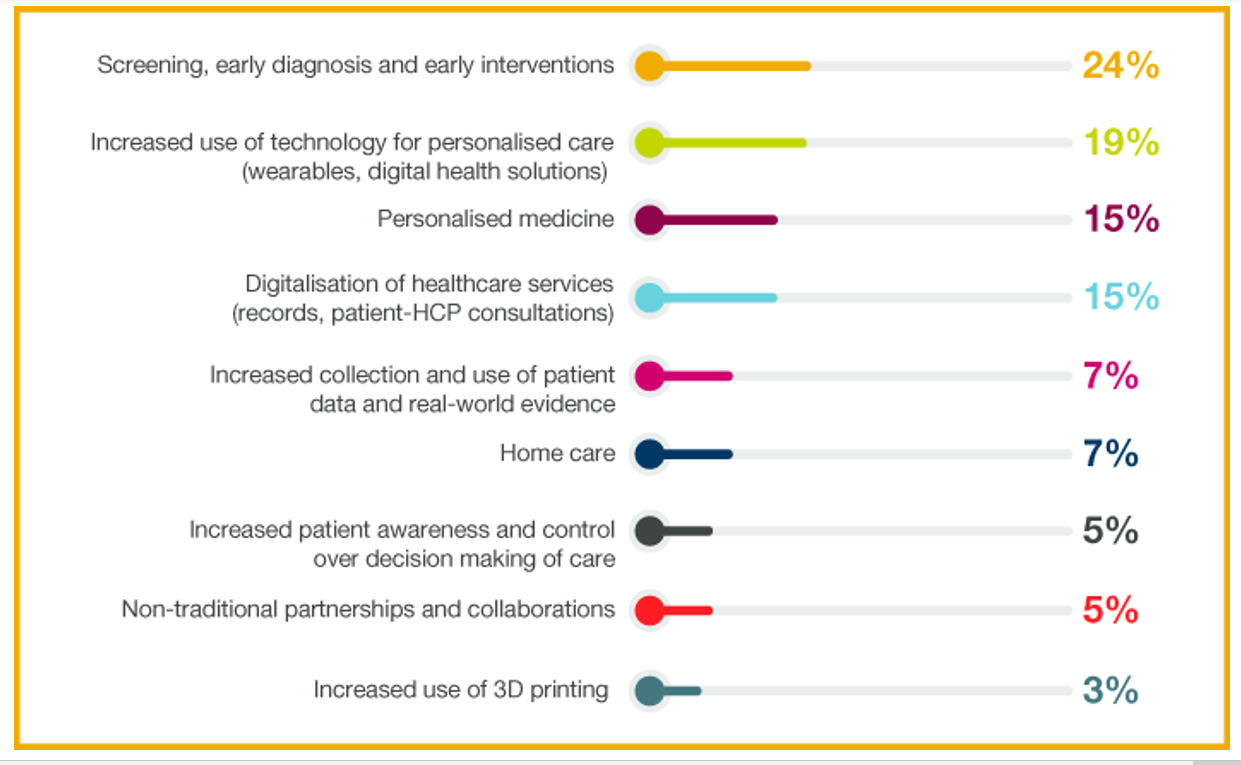 Partnerships and support are key
Partnerships and support are key
Overall, the results reflected the value of collaboration, with 73% of all respondents ranking partnerships as ‘very important’ for driving the healthcare solutions of tomorrow (Fig. 3).
Figure 3. How important do you think partnerships are for driving tomorrow’s healthcare solutions, given the trends and move from pill to platform? (Scale 1–5)
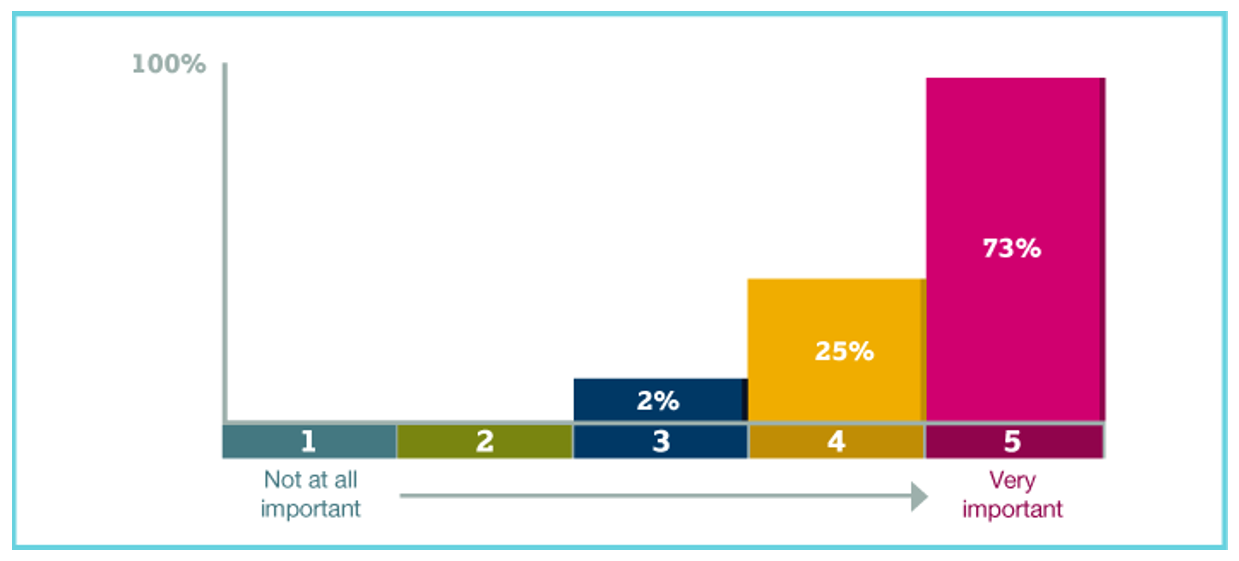
Many of the start-ups surveyed were small and relatively new: 55% were under three years old, while 72% comprised teams of 15 employees or less. Growing businesses such as these are often likely to benefit from collaborative support and additional industry knowledge and experience. Responses highlighted a widespread need for improvement in this area, however, with just 12% of participants rating current levels of support as ‘excellent’. Almost one in ten went as far as to say support was ‘very poor’ (Fig. 4).
Figure 4. How would you rate the current support your company is receiving from partners/funders/investors? (Scale 1–5)
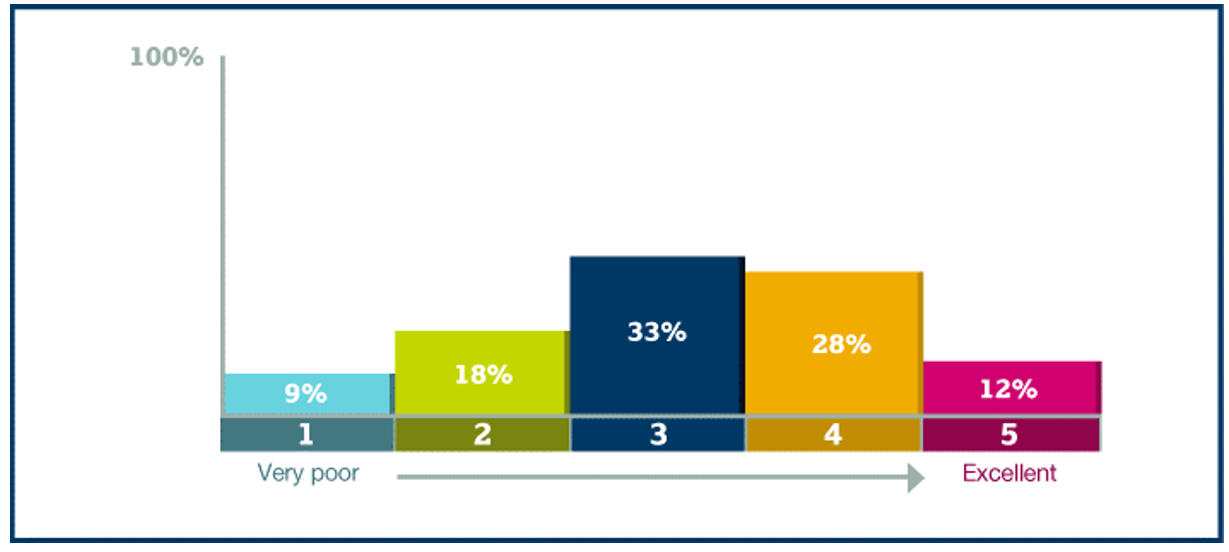
Founders were also asked about the areas in which they need the most support from partners, funders and investors, with 47% ranking funding as most important, and a further 21% indicating that they are in need of scaling support (Fig. 5).
Figure 5. Where does your company need the most support from partners/funders/investors?
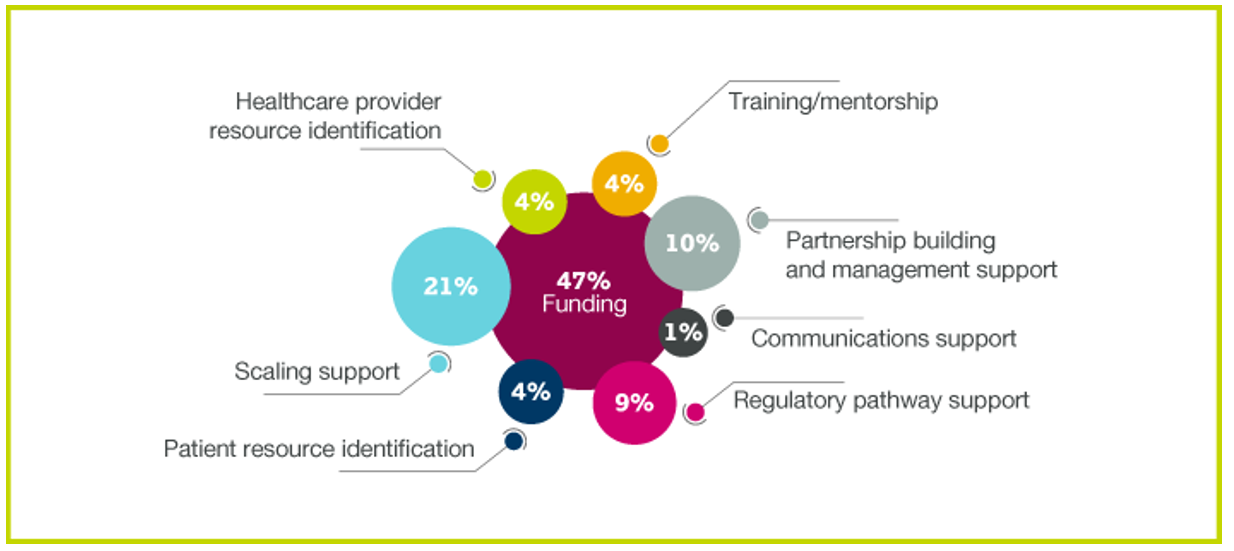
Understanding the key business challenges for founders
In order to better understand the key issues faced by entrepreneurs, they were asked about the challenges they faced when founding their business. Respondents cited a lack of financial support (74%) and lack of a network (53%) as the top two challenges they faced. In terms of future founders, 37% of survey respondents felt they would benefit most from financial support, while a further 37% chose networking, and 26% said mentorship would be most beneficial – though many would likely approve of a combination of all three.
Perspectives on diversity
Diversity and inclusion were also seen as important aspects of innovation: an overwhelming 95% of respondents believe that diversity affects value, while 83% of those surveyed already have diversity and inclusion strategies in place.
The results also identified a clear gender gap in start-ups, with females making up just 18% of the total company founders surveyed.
The future of healthcare innovation
So what does the future of healthcare look like? The industry is fast-moving and often unpredictable; should we sit around in a metaphorical waiting room and see what happens? A better idea is to create the future – one of integrated healthcare led by digital and partnerships.
We believe that patient experiences and outcomes are a shared responsibility, and that working together with different stakeholders is essential to drive innovation and shape the way healthcare is delivered.
Start-up founders are a key part of the equation, many of them purpose‑driven entrepreneurs who want to empower patients and have a positive impact on society. With support from big pharma, they can help deliver value beyond just medicines, contributing to fully integrated patient-centred healthcare ecosystems. In order to support them in the best way, we just need to listen to them.
♣♣♣
Notes:
- This blog post represents the views of its author(s), not the position of the European Commission, LSE Business Review, or the London School of Economics.
- Featured image by Shopify Partners, under a Burst licence
- When you leave a comment, you’re agreeing to our Comment Policy.






Fantastic research and well-written article. Indeed, very relevant and important to apply in today’s perpetually changing healthcare and business landscapes.